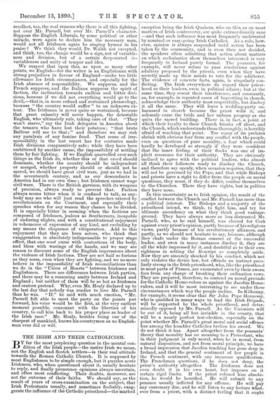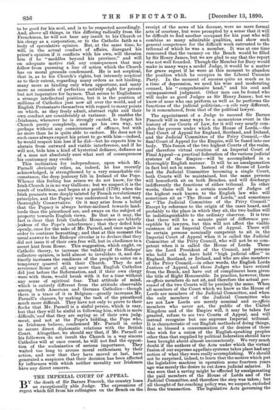THE IRISH AND THEIR CATHOLICISM.
BY far the most perplexing question in the mental con- dition of the Irish people—the native Irish we mean, not the English and Scotch settlers—is their real attitude towards the Roman Catholic Church. It is supposed by most Englishmen to be simple enough, but it puzzles acute Irishmen, who, when questioned about it, usually hesitate to reply, and finally pronounce opinions always uncertain, and often most conflicting. Their doubts, moreover, are not the outcome of their faiths. We should say, as the result of years of cross-examination on the subject, that Irish Protestants usually, and sometimes foolishly, exag- gerate the influence of the Catholic priesthood—the marked exception being the Irish Quakers, who on this, as on most matters of Irish controversy, are quite extraordinarily sane —and that such influence was most frequently underrated by nominal or easy-going Irish Catholics. As a rule, how- ever, opinion is always suspended until action has been taken by the community, and is even then not decided, the speakers often admitting that action about matters on which ecclesiastics show themselves interested is very frequently in Ireland purely formal. The peasants, for example, will never refuse to pass resolutions against adultery proposed by the priests, even when they have secretly made up their minds to vote for the adulterer. The evidence of concrete facts, again, is singularly con- flicting. The Irish everywhere do regard their priest- hood as their leaders, even in political affairs ; but at the same time, they resent their interference, and constantly, as, for example, in repeated cases of boycotting in church, acknowledge their authority most respectfully, but disobey it all the same. They will leave a wedding-party un- harassed in church because the priest wills it, and solemnly curse the bride and her unborn progeny as she quits the sacred building. There is, in fact, a point at which their loyalty to their Church breaks off short, and the Church, which understands them thoroughly, is horribly afraid of reaching that point. Too many of its prelates shrink with obvious fear from any conflict with the people, even on questions of pure morality, a fear which could hardly be developed so strongly if they were confident that the inner feeling of their flocks was one of im- plicit reverence for their authority. They are obviously inclined to agree with the political leaders, who almost all think their followers ready to disobey the Church, and therefore say openly, when occasion requires, that they will not be governed by the Pope, and that while Bishops and priests have a right to differ from the people on moral questions, they must, if they do differ, confine themselves to the Churches. There they have rights, but in politics they have none. In this uncertainty as to Irish opinion, the result of the conflict between the Church and Mr. Parnell has more than a political interest. The Bishops and a majority of the priesthood intend, we think, to fight him, and try for ultimate ascendency on what they think good. vantage- ground. They have always more or less distrusted Mr. Parnell, who, as he said himself, was elected for Cork against every priest's opinion, partly because of his religious views, partly because of his revolutionary alliances, and partly, as we should not hesitate to say, because, although they chafe under the Roman censure of the successful leader, and even in many instances disobey it, they are all the while impressed by it, and doubtful as to their own rightness in setting the Rescript so completely aside. Now they are sincerely shocked by his conduct, which not only violates the divine law, but offends an instinct pecu- liarly strong in the Irish priesthood, who, like the priesthood in most parts of France, are exonerated even by their sworn foes from any charge of breaking their ordination vows. They are prepared, therefore, to contend on moral grounds for the Catholic Home-rulers as against the Jacobin Home- rulers, and it will be most interesting to see under those circumstances which way the people incline. In Kilkenny, for example, it seems clear that Sir John Pope Hennessy, who is qualified in many ways to lead the Irish Brigade, will be supported by the whole priesthood, and deter- minedly opposed by Mr. Parnell. As the Unionists will be out of it, being all but invisible in the county, that will be a nearly perfect test-election, especially on the point whether Mr. Parnell's great moral and social offence has among the humbler Catholics broken his sword. We do not think it has. Apart altogether from the peasants' theory that morality has no meaning to a Protestant, who in their judgment is only moral, when he is moral, from natural disposition, and not from moral principle, we have a broad impression that Jacobin teaching has gone deep in Ireland, and that the general sentiment of her people is the French sentiment, with one immense qualification. The Frenchman questions, if he does not deny, the priest's authority altogether. The Irishman does not even doubt it in his own heart, but imposes on it certain rigid limits. If the priest refused him absolu- tion, he would be horrified. He will submit to any penance usually inflicted for any offence. He will pay any customary due, and he will listen to any lecture what- ever from a priest, with a distinct feeling that it ought to be good for his soul, and is to be respected accordingly. And, above all things, in this differing radically from the Frenchman, he will not bear any insult to his Church or his clergy as a corporation, or to the Catholic faith as a body of speculative opinion. But, at the same time, he will, in the actual conduct of affairs, disregard his priest's opinion if it conflicts with his own, will threaten him if he " meddles beyond his province," and will on adequate motive risk any consequences that may follow from pursuing a line of action which the Church has on moral grounds condemned. He is not sceptical, that is, as to his Church's rights, but intensely sceptical as to their extent, regarding many orders as not binding, .many more as binding only when opportune, and many more as counsels of perfection entirely right for priests but not imperative for laymen. That seems to Englishmen a strange intellectual position, but it is the position of 'millions of Catholics just now all over the world, and of English Protestants themselves with regard to many points on which, as they freely admit, abstract right and their ,own conduct are considerably at variance. It enables the eIrishman, whenever he is strongly excited, to forget his ,Church pretty completely, and go his own way, not -,perhaps without any consciousness of offence, but with .no more than he is quite able to endure. He does not in _such cases always expect his priest to go with him—indeed, he would respect him less if he did—but he expects him to .abstain from outward and visible interference, and if he will not, bids him a kind of hysterical defiance, defiance as of a man not absolutely sure what sort of consequences ..his contumacy may evoke. This inclination for independence, upon which Mr. Parnell obviously relies, as, indeed, he has recently acknowledged, is strengthened by a very remarkable cir- cumstance, the deep jealousy felt in Ireland of the Pope. Whence this feeling has arisen we do not know, for the Irish Church is in no way Gallivan; but we suspect it is the result of tradition, and began at a period (1798) when the Irish peasants were deeply tainted by French revolutionary principles, and the Papacy was understood to be, and was, thoroughly Conservative. Or it may arise from a belief that the Papacy is always better-inclined towards land- lords than the priesthood are, and sways on the subject of property towards English views. Be that as it may, the - fact is clear that Irish Catholic Home-rulers are bitterly , jealous of the Pope's interference ; that they defied him openly, once for the sake of Mr. Parnell, and once again in order to continue boycotting; and that at this moment the usual answer to the Bishops' circular is to declare that they did not issue it of their own free will, but in obedience to a secret hint from Rome. This suggestion, which ought, on Catholic theory, to increase the validity of the Bishops' collective opinion, is held almost to invalidate it, and dis- tinctly increases the readiness of the people to enter on a temporary quarrel with their Church. They do not reverence Rome at all, any more than English Catholics -did just before the Reformation, and if their own clergy • were with them, would break with it for a time without . any sense of spiritual fear. That attitude of mind, . which is entirely different from the attitude observable among both American and German Catholics—though there is a trace of it in Belgium—greatly increases Mr. Parnell's chances, by making the task of the priesthood much more difficult. They have not only to prove to their flocks that Mr. Parnell is a sinful person, which is easy, but that they will be sinful in following him, which is more difficult,`and that they are saying so of their own judg- ment, and not at the Pope's bidding, the Pope who, as Irishmen believe, condemned Mr. Parnell in order to secure direct diplomatic relations with the British Court. Altogether, we should say that, if Mr. Parnell or his followers do not insult the Church in a way sincere Catholics will at once resent, he will not find the opposi- tion of the ecclesiastics of serious importance. They waited too long to arouse moral enthusiasm by their action, and now that they have moved at last, have generated a suspicion that their decision has been affected by influences with which neither morality nor Irishmen have any direct concern.











































 Previous page
Previous page